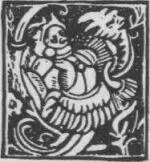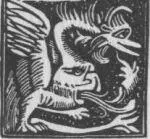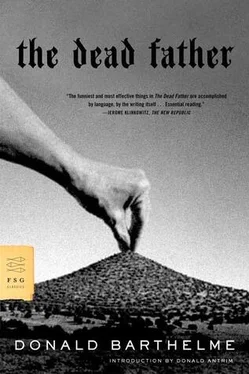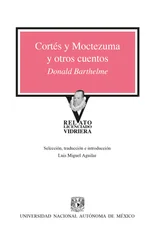Donald Barthelme - The Dead Father
Здесь есть возможность читать онлайн «Donald Barthelme - The Dead Father» весь текст электронной книги совершенно бесплатно (целиком полную версию без сокращений). В некоторых случаях можно слушать аудио, скачать через торрент в формате fb2 и присутствует краткое содержание. Жанр: Современная проза, на английском языке. Описание произведения, (предисловие) а так же отзывы посетителей доступны на портале библиотеки ЛибКат.
- Название:The Dead Father
- Автор:
- Жанр:
- Год:неизвестен
- ISBN:нет данных
- Рейтинг книги:5 / 5. Голосов: 1
-
Избранное:Добавить в избранное
- Отзывы:
-
Ваша оценка:
- 100
- 1
- 2
- 3
- 4
- 5
The Dead Father: краткое содержание, описание и аннотация
Предлагаем к чтению аннотацию, описание, краткое содержание или предисловие (зависит от того, что написал сам автор книги «The Dead Father»). Если вы не нашли необходимую информацию о книге — напишите в комментариях, мы постараемся отыскать её.
The Dead Father
The Dead Father — читать онлайн бесплатно полную книгу (весь текст) целиком
Ниже представлен текст книги, разбитый по страницам. Система сохранения места последней прочитанной страницы, позволяет с удобством читать онлайн бесплатно книгу «The Dead Father», без необходимости каждый раз заново искать на чём Вы остановились. Поставьте закладку, и сможете в любой момент перейти на страницу, на которой закончили чтение.
Интервал:
Закладка:
There are twenty-two kinds of fathers, of which only nineteen are important. The drugged father is not important. The lionlike father (rare) is not important. The Holy Father is not important, for our purposes. There is a certain father who is falling through the air, heels where his head should be, head where his heels should be. The falling father has grave meaning for all of us. The wind throws his hair in every direction. His cheeks are flaps almost touching his ears. His garments are shreds, telltales. This father has the power of curing the bites of mad dogs, and the power of choreographing the interest rates. What is he thinking about, on the way down? He is thinking about emotional extravagance. The Romantic Movement, with its exploitation of the sensational, the morbid, the occult, the erotic! The falling father has noticed Romantic tendencies in several of his sons. The sons have taken to wearing slices of raw bacon in their caps, and speaking out against the interest rates. After all he has done for them! Many bicycles! Many gardes-bébés! Electric guitars uncountable! Falling, the falling father devises his iron punishment, resolved not to err again on the side of irresponsible mercy. He is also thinking about his upward progress, which doesn’t seem to be doing so well at the moment. There is only one thing to do: work harder! He decides that if he can ever halt the “downturn” that he seems to be in, he will redouble his efforts, really put his back into it, this time. The falling father is important because he embodies the “work ethic,” which is a dumb one. The “fear ethic” should be substituted, as soon as possible. Peering skyward at his endless hurtling, let us simply shrug, fold up the trampoline we were going to try and catch him in, and place it once again on top of the rafters, in the garage.

To find a lost father: The first problem in finding a lost father is to lose him, decisively. Often he will wander away from home and lose himself. Often he will remain at home but still be “lost” in every true sense, locked away in an upper room, or in a workshop, or in the contemplation of beauty, or in the contemplation of a secret life. He may, every evening, pick up his gold-headed cane, wrap himself in his cloak, and depart, leaving behind, on the coffee table, a sealed laundry bag in which there is an address at which he may be reached, in case of war. War, as is well known, is a place at which many fathers are lost, sometimes temporarily, sometimes forever. Fathers are frequently lost on expeditions of various kinds (the journey to the interior). The five best places to seek this kind of lost father are Nepal, Rupert’s Land, Mount Elbrus, Paris, and the agora. The five kinds of vegetation in which fathers most often lose themselves are needle-leaved forest, broad-leaved forest mainly evergreen, broad-leaved forest mainly deciduous, mixed needle-leaved and broad-leaved forest, and tundra. The five kinds of things fathers were wearing when last seen are caftans, bush jackets, parkas, Confederate gray, and ordinary business suits. Armed with these clues then, you may place an advertisement in the newspaper: Lost, in Paris, on or about February 24, a broad-leaf-loving father, 6’ 2”, wearing a blue caftan, may be armed and dangerous, we don’t know, answers to the name Old Hickory. Reward. Having completed this futile exercise, you are then free to think about what is really important. Do you really want to find this father? What if, when you find him, he speaks to you in the same tone he used before he lost himself? Will he again place nails in your mother, in her elbows and back of the knee? Remember the javelin. Have you any reason to believe that it will not, once again, flash through the seven-o’clock-in-the-evening air? What we are attempting to determine is simple: Under what conditions do you wish to live? Yes, he “nervously twiddles the stem of his wineglass.” Do you wish to watch him do so on into the last quarter of the present century? I don’t think so. Let him take those mannerisms, and what they portend, to Borneo, they will be new to Borneo. Perhaps in Borneo he will also nervously twiddle the stem of, etc., but he will not be brave enough to manufacture, there the explosion of which this is a sign. Throwing the roast through the mirror. Thrusting a belch big as an opened umbrella into the middle of something someone else is trying to say. Beating you, either with a wet, knotted rawhide, or with an ordinary belt. Ignore that empty chair at the head of the table. Give thanks.

On the rescue of fathers: Oh they hacked him pretty bad, they hacked at him with axes and they hacked at him with hacksaws but me and my men got there fast, wasn’t as bad as it might have been, first we fired smoke grenades in different colors, yellow and blue and green, that put a fright into them but they wouldn’t quit, they opened up on us with 81-mm. mortars and meanwhile continued to hack. I sent some of the boys out to the left to flank them but they’d put some people over there to prevent just that and my men got into a fire fight with their support patrol, no other way to do the thing but employ a frontal assault, which we did, at least it took the pressure off him, they couldn’t continue to hack and deal with our assault at the same time. We cleaned their clocks for them, I will say that, they fell back to the left and linked up with their people over there, my flanking party broke off contact as I had instructed and let them flee unpursued. We came out of it pretty well, had a few wounded but that’s all. We turned immediately to the task of bandaging him in the hacked places, bloody great wounds but our medics were very good, they were all over him, he never made a complaint or uttered a sound, not a whimper out of him, not a sign. This took place at the right arm, just above the elbow, we left some pickets there for a few days until the arm had begun to heal, I think it was a successful rescue, we returned to our homes to wait for the next time. I think it was a successful rescue. It was an adequate rescue.
Then they attacked him with sumo wrestlers, giant fat men in loincloths. We countered with loincloth snatchers — some of our best loincloth snatchers. We were successful. The hundred naked fat men fled. I had rescued him again. Then we sang “Genevieve, Oh, Genevieve.” All the sergeants gathered before the veranda and sang it, and some enlisted men too — some enlisted men who had been with the outfit for a long time. They sang it, in the twilight, pile of damp loincloths blazing fitfully off to the left. When you have rescued a father from whatever terrible threat menaces him, then you feel, for a moment, that you are the father and he is not. For a moment. This is the only moment in your life you will feel this way.

The sexual organs of fathers: The penises of fathers are traditionally hidden from the inspection of those who are not “clubbable,” as the expression runs. These penises are magical, but not most of the time. Most of the time they are “at rest.” In the “at rest” position they are small, almost shriveled, and easily concealed in carpenter’s aprons, chaps, bathing suits, or ordinary trousers. Actually they are not anything that you would want to show anyone, in this state, they are rather like mushrooms or, possibly, large snails. The magic, at these times, resides in other parts of the father (fingertips, right arm) and not in the penis. Occasionally a child, usually a bold six-year-old daughter, will request permission to see it. This request should be granted, once. But only in the early morning, when you are in bed, and only when an early morning erection is not present. Yes, let her touch it (lightly, of course), but briefly. Do not permit her to linger or get too interested. Be matter-of-fact, kind, and undramatic. Pretend, for the moment, that it is as mundane as a big toe. And then calmly, without unseemly haste, cover it up again. Remember that she is being allowed to “touch it,” not “hold it”; the distinction is important. About sons you must use your own judgment. It is injudicious (as well as unnecessary) to terrify them; you have many other ways of accomplishing that. Chancre is a good reason for not doing any of this. When the penises of fathers are semi-erect, titillated by some stray erotic observation, such as a glimpse of an attractive female hoof, bereft of its slipper, knowing smiles should be exchanged with the other fathers present (better: half smiles) and the matter let drop. Semi-erectness is a half measure, as Aristotle knew; that is why most of the penises in museums have been knocked off with a mallet. The original artificers could not bear the idea of Aristotle’s disapproval, and mutilated their work rather than merit the scorn of the great Peripatetic. The notion that this mutilation was carried out by later (Christian) “cleanup squads” is untrue, pure legend. The matter is as I have presented it. The excited, mad, fully erect penis should be displayed only to the one who has excited it, for his or her lips, for the kiss of amelioration. Many other things can be done with the penises of fathers, but these have already been adequately described by other people. The penises of fathers are in every respect superior to the penises of nonfathers, not because of size or weight or any consideration of that sort but because of a metaphysical “responsibility.” This is true even of poor, bad, or insane fathers. African artifacts reflect this special situation. Pre-Columbian artifacts, for the most part, do not.
Читать дальшеИнтервал:
Закладка:
Похожие книги на «The Dead Father»
Представляем Вашему вниманию похожие книги на «The Dead Father» списком для выбора. Мы отобрали схожую по названию и смыслу литературу в надежде предоставить читателям больше вариантов отыскать новые, интересные, ещё непрочитанные произведения.
Обсуждение, отзывы о книге «The Dead Father» и просто собственные мнения читателей. Оставьте ваши комментарии, напишите, что Вы думаете о произведении, его смысле или главных героях. Укажите что конкретно понравилось, а что нет, и почему Вы так считаете.












